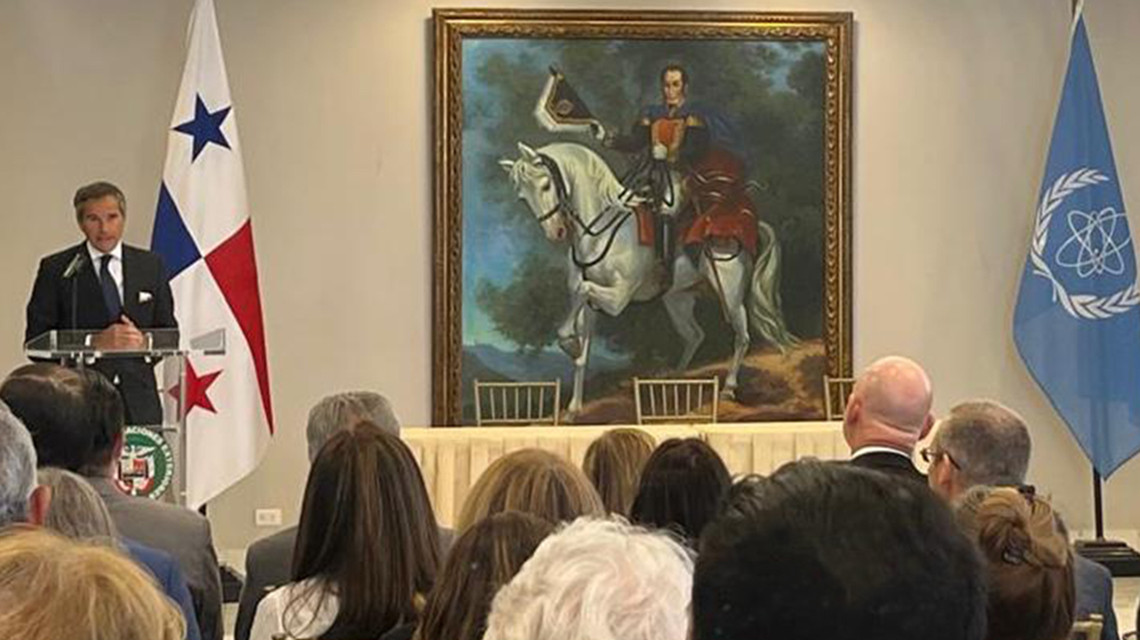IAEA Director General Rafael Mariano Grossi has been to Panama for high level meetings to enhance support for the country's efforts to strengthen cancer care, food security and water resource management. During his visit, Mr Grossi met with Panama's Foreign Minister, Javier Martínez-Acha Vásquez, to discuss closer cooperation on the peaceful uses of nuclear technology for the benefit of Panama's people.
Mr Grossi and Panama's Minister of Health, Fernando Boyd Galindo, signed a Memorandum of Understanding to expand cancer care and treatment through the Agency's Rays of Hope initiative. Mr Grossi also signed a Memorandum of Understanding with Panama's Vice Minister of Agricultural Development, Francisco Ameglio, to fight screwworm and improve water management through the IAEA's Atoms4Food programme.
Started my visit to Panama with a warm welcome from @CancilleriaPma's @JavierAchaPma.
My visit underscores @IAEAorg's support to 🇵🇦-advancing cancer care with #RaysOfHope, fighting screwworm under #Atoms4Food, and enhancing water management. We'll continue supporting Panama. pic.twitter.com/JLD7zTxo8V
— Rafael MarianoGrossi (@rafaelmgrossi) January 17, 2025
Cancer care and sustainable agriculture-two pillars of a healthier future for 🇵🇦.
Signed two key agreements with @MINSAPma's Fernando Boyd & @MIDAPma's @Fameglio: #RaysOfHope to enhance cancer care and #Atoms4Food to boost food security, including the fight against screwworm. pic.twitter.com/lNDt9nGlfb
— Rafael MarianoGrossi (@rafaelmgrossi) January 17, 2025
Rays of Hope: Cancer Care for All
During a visit to Panama's National Oncology Institute, Mr Grossi expressed strong support for the country's structured approach to strengthening national capacities for cancer care and treatment. Cancer is one of the fastest growing diseases in Panama. The Panamanian Government requested to join the IAEA's Rays of Hope initiative in June 2023, a process which led to today's Memorandum of Understanding.
Through Rays of Hope, the IAEA will support Panama with a comprehensive strategy for improving cancer care and treatment. This includes providing assistance the National Oncology Institute and the Ciudad de la Salud Hospital in Panama City and supporting a new oncology centre in the Chiriquí region. The IAEA will provide a new linear accelerator (LINAC) for Chiriquí, enabling the use of novel radiotherapy techniques to treat cancer patients. The Agency will also provide two mammography units as well as training and capacity building in medical physics, nuclear medicine, radiology, radiotherapy, radiation oncology and nutrition to enhance cancer care.
Atoms4Food: Fighting Screwworm
Screwworm is a parasitic insect pest that can have a devastating effect on livestock production, resulting in reduced milk and meat yields and increased mortality. Through the Atoms4Food programme, the IAEA will support Panama in using the environmentally friendly Sterile Insect Technique (SIT) to fight the latest outbreak of screwworm. The Sterile Insect Technique has been used successfully around the world for over 50 years to tackle pests that destroy fruit and vegetables and kill livestock. This technique uses radiation for mass sterilization of male insect pests, which prevents them from producing offspring and thereby reduces the pest population. Panama is already working with the IAEA to strengthen its capacity to use SIT to control the Mediterranean fruit fly, which poses a major threat to fruit and vegetable crops.
Through its cooperation with the IAEA under the Atoms4Food programme, Panama will also benefit from technical assistance to strengthen the country's capabilities in improving crop varieties, animal production and health, soil and water management and crop nutrition, as well as food safety and control.

Signing ceremony for Memoranda of Understanding between Panama and the IAEA on Rays of Hope and Atoms4Food. From left: Vice Minister for Multilateral Affairs and Cooperation Carlos Guevara Mann, IAEA Director General Rafael Mariano Grossi, Minister of Health Fernando Boyd Galindo and Vice Minister of Agricultural Development Francisco Ameglio. (Photo: IAEA)
Tackling Global Challenges through Effective Multilateralism
Mr Grossi underscored the key role of multilateralism in tackling global challenges like food security, cancer and climate change in a public lecture at Panama's Ministry of Foreign Affairs hosted by Vice Minister for Multilateral Affairs and Cooperation Carlos Guevara Mann.
The Director General highlighted the IAEA's support for the people of Panama through the peaceful uses of nuclear science and technology. Effective multilateralism delivers real benefits and fosters progress toward sustainable development, he said.
Mr Grossi also visited the Salon Bolivar, where the Amphictyonic Congress of Panama met in 1826, a moment of great importance in Latin American history that continues to inspire efforts toward cooperation among nations.

IAEA Director General Rafael Mariano Grossi discusses the benefits of multilateralism at Panama's Ministry of Foreign Affairs on 17 January 2025. (Photo: IAEA)






